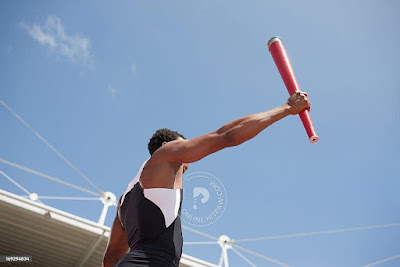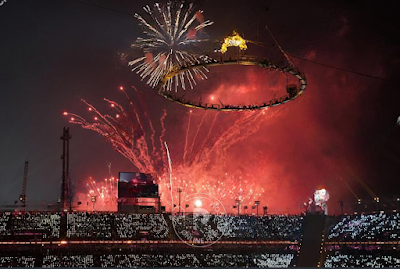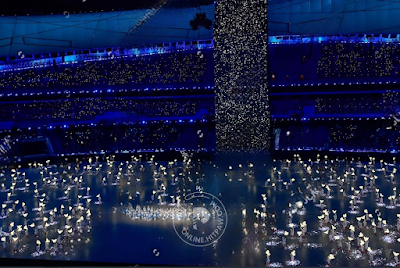The Olympic Movement strongly condemns any initiative to fully politicise sport, in particular the establishment of fully politicised sports events by the Russian government.
The IOC strongly urges all stakeholders of the Olympic Movement and all governments to reject any participation in, and support of, any initiative that intends to fully politicise international sport.
The International Olympic Committee is a volunteer-run, civil society, non-governmental organisation that exists with the purpose of using sport to improve the world. Over 90% of its revenue is allocated towards supporting the global athletic community. This means that USD 4.2 million is donated daily to support athletes and sports groups throughout the globe.
The International Olympic Committee (IOC) reiterates that it opposes the politicisation of sports in the strongest possible way. This stance is supported by the Olympic Charter's Fundamental Principle, which states:
Given that sports take place inside societal frameworks, Olympic Movement sports groups must maintain political neutrality. They enjoy the freedom to create and regulate sports regulations, to choose the composition and management of their organisations, to hold free and fair elections, and to see to it that the rules of good governance are followed. These are just a few of the rights and responsibilities that come with autonomy.
Read More:
Additionally, the Olympic Charter declares:
"To lead the Olympic Movement and promote Olympic ideals globally is the IOC's goal. It is the responsibility of the IOC to resist any misuse of sport and athletes for political or economic gain.

A/RES/78/10 - Building a peaceful and better world through sport and the Olympic Ideal from November 2023 is one of the resolutions of the United Nations (UN) General Assembly that specifically "acknowledges the fundamental principles of the Olympic Charter." These resolutions have repeatedly recognised and supported these principles.
"To lead the Olympic Movement and promote Olympic ideals globally is the IOC's goal. It is the responsibility of the IOC to resist any misuse of sport and athletes for political or economic gain.
A/RES/78/10 - Building a peaceful and better world through sport and the Olympic Ideal from November 2023 is one of the resolutions of the United Nations (UN) General Assembly that specifically "acknowledges the fundamental principles of the Olympic Charter." These resolutions have repeatedly recognised and supported these principles.
Read More:
The UN General Assembly "supports the independence and autonomy of sport as well as the mission of the International Olympic Committee in leading the Olympic movement and of the International Paralympic Committee in leading the Paralympic movement," according to resolution A/RES/77/27, which was adopted in November 2022 and emphasised the role of the IOC as a leader in sport.
With the exception of the most recent resolution, which was only approved with the Russian Federation and the Syrian Arab Republic abstaining, the majority of these resolutions have been ratified by agreement by all UN members.

The IOC observes that the Russian government plans to host only political sporting events in Russia, which is against the Fundamental Principles of the Olympic Charter and UN General Assembly decisions. In order to hold the summer and winter "Friendship Games," the Russian government established and provided funding for the "International Friendship Association" (IFA).
It appears that the "Winter Friendship Games" will take place in Sochi, Russia in 2026, while the inaugural "Summer Friendship Games" will take place in Moscow and Ekaterinburg, Russia, in September 2024.
In order to do this, the Russian government has initiated a very aggressive diplomatic assault, sending ambassadors, delegations, ministers, and other high-ranking officials to negotiate with countries throughout the globe. By purposefully avoiding the sports organisations in their target nations, they are drawing even more attention to their strictly political objective. This is both a flagrant transgression of the Olympic Charter and a breach of many UN resolutions.

The Russian Federation's attempt to politicise sport is cynical. Representing all Olympic athletes worldwide, the IOC Athletes' Commission is adamantly against the use of sportsmen as political campaign props. The Commission even recognises the possibility that athletes may be coerced into taking part in a highly politicised sporting event by their governments and then used as props in a political propaganda effort.
The integrity of tournaments and international anti-doping rules are also completely disregarded by the Russian authorities. This government was linked to the widespread doping scheme at the 2014 Olympic Winter Games in Sochi and, subsequently, to the manipulation of anti-doping measures.
The World Anti-Doping Agency (WADA) stated only last week that it is "continuously concerned about Russia's plans to host the Friendship Games, an unofficial event, in September 2024." It is especially concerning that competitors' health and fairness may be jeopardised because the competition will not be governed by the World Anti-Doping Code (Code). WADA requests that all Code Signatories proceed with care and refrain from endorsing this event, as the Agency is unable to verify the existence of any anti-doping programme. This stance is supported by the facts that Russia's National Anti-Doping Agency (RUSADA) does not currently comply with the Code, that Russia does not now have a laboratory recognised by WADA, and that public confidence in the country's anti-doping framework is very poor.
With the exception of the most recent resolution, which was only approved with the Russian Federation and the Syrian Arab Republic abstaining, the majority of these resolutions have been ratified by agreement by all UN members.
The IOC observes that the Russian government plans to host only political sporting events in Russia, which is against the Fundamental Principles of the Olympic Charter and UN General Assembly decisions. In order to hold the summer and winter "Friendship Games," the Russian government established and provided funding for the "International Friendship Association" (IFA).
It appears that the "Winter Friendship Games" will take place in Sochi, Russia in 2026, while the inaugural "Summer Friendship Games" will take place in Moscow and Ekaterinburg, Russia, in September 2024.
In order to do this, the Russian government has initiated a very aggressive diplomatic assault, sending ambassadors, delegations, ministers, and other high-ranking officials to negotiate with countries throughout the globe. By purposefully avoiding the sports organisations in their target nations, they are drawing even more attention to their strictly political objective. This is both a flagrant transgression of the Olympic Charter and a breach of many UN resolutions.
The Russian Federation's attempt to politicise sport is cynical. Representing all Olympic athletes worldwide, the IOC Athletes' Commission is adamantly against the use of sportsmen as political campaign props. The Commission even recognises the possibility that athletes may be coerced into taking part in a highly politicised sporting event by their governments and then used as props in a political propaganda effort.
The integrity of tournaments and international anti-doping rules are also completely disregarded by the Russian authorities. This government was linked to the widespread doping scheme at the 2014 Olympic Winter Games in Sochi and, subsequently, to the manipulation of anti-doping measures.
The World Anti-Doping Agency (WADA) stated only last week that it is "continuously concerned about Russia's plans to host the Friendship Games, an unofficial event, in September 2024." It is especially concerning that competitors' health and fairness may be jeopardised because the competition will not be governed by the World Anti-Doping Code (Code). WADA requests that all Code Signatories proceed with care and refrain from endorsing this event, as the Agency is unable to verify the existence of any anti-doping programme. This stance is supported by the facts that Russia's National Anti-Doping Agency (RUSADA) does not currently comply with the Code, that Russia does not now have a laboratory recognised by WADA, and that public confidence in the country's anti-doping framework is very poor.
Read More:
For each of the following reasons:
The flagrant disregard for the Olympic Charter, the transgression of the relevant UN resolutions,the disregard for the athletes and the fairness of sporting events.
The flagrant disregard for the Olympic Charter, the transgression of the relevant UN resolutions,the disregard for the athletes and the fairness of sporting events.


0 Comments
If you are dissatisfied with my opinion, kindly send me an e-mail.
Emoji